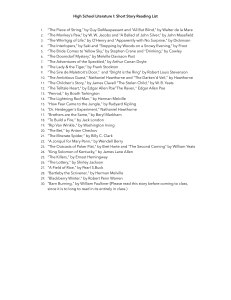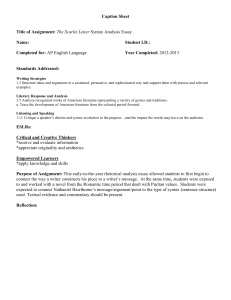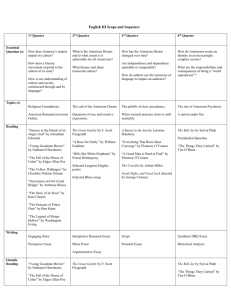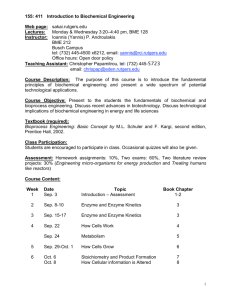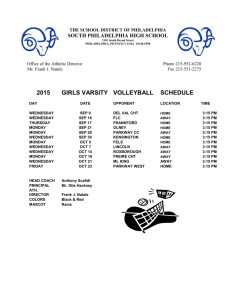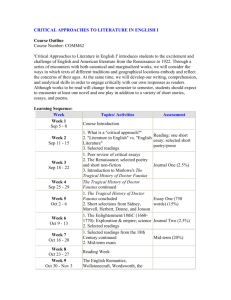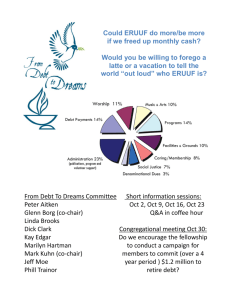ENGL 231W: AMERICAN LITERATURE TO 1865
advertisement
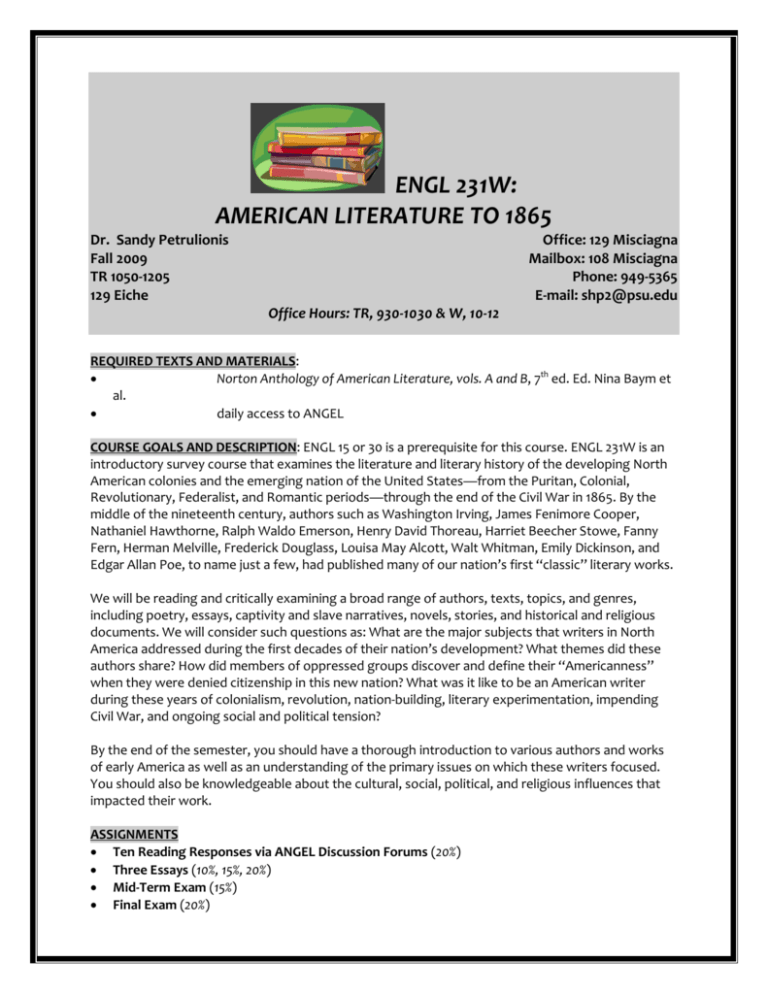
ENGL 231W: AMERICAN LITERATURE TO 1865 Dr. Sandy Petrulionis Fall 2009 TR 1050-1205 129 Eiche Office: 129 Misciagna Mailbox: 108 Misciagna Phone: 949-5365 E-mail: shp2@psu.edu Office Hours: TR, 930-1030 & W, 10-12 REQUIRED TEXTS AND MATERIALS: • Norton Anthology of American Literature, vols. A and B, 7th ed. Ed. Nina Baym et al. • daily access to ANGEL COURSE GOALS AND DESCRIPTION: ENGL 15 or 30 is a prerequisite for this course. ENGL 231W is an introductory survey course that examines the literature and literary history of the developing North American colonies and the emerging nation of the United States—from the Puritan, Colonial, Revolutionary, Federalist, and Romantic periods—through the end of the Civil War in 1865. By the middle of the nineteenth century, authors such as Washington Irving, James Fenimore Cooper, Nathaniel Hawthorne, Ralph Waldo Emerson, Henry David Thoreau, Harriet Beecher Stowe, Fanny Fern, Herman Melville, Frederick Douglass, Louisa May Alcott, Walt Whitman, Emily Dickinson, and Edgar Allan Poe, to name just a few, had published many of our nation’s first “classic” literary works. We will be reading and critically examining a broad range of authors, texts, topics, and genres, including poetry, essays, captivity and slave narratives, novels, stories, and historical and religious documents. We will consider such questions as: What are the major subjects that writers in North America addressed during the first decades of their nation’s development? What themes did these authors share? How did members of oppressed groups discover and define their “Americanness” when they were denied citizenship in this new nation? What was it like to be an American writer during these years of colonialism, revolution, nation-building, literary experimentation, impending Civil War, and ongoing social and political tension? By the end of the semester, you should have a thorough introduction to various authors and works of early America as well as an understanding of the primary issues on which these writers focused. You should also be knowledgeable about the cultural, social, political, and religious influences that impacted their work. ASSIGNMENTS • Ten Reading Responses via ANGEL Discussion Forums (20%) • Three Essays (10%, 15%, 20%) • Mid-Term Exam (15%) • Final Exam (20%) CLASS POLICIES Late assignments: Late papers will be dropped a letter grade for each class that they are late and will not be accepted more than one week after the original due date. Assignments may always be handed in early—in person or in my mailbox in 108 Misciagna. Make-Up Exams: Make-up exams will be given only if you miss class due to a documented emergency. Portable Electronic Devices, Headphones, etc.: A college classroom is not “business as usual.” Please turn off or mute and place under your desk all cell phones, pagers, beepers, watches, i-pods, cameras, and any other gadgets that make noise and are distracting. Better yet, leave them at home or in the car . Attendance: You can only benefit from and contribute to class discussion if you’re here. Regular attendance and class participation are expected if you plan to pass ENGL 231W. Tardiness: Repeated tardiness is rude to everyone in the class and will reduce your final grade in ENGL 231W. Class cancellation: To find out if class has been cancelled, go to <www.aa.psu.edu/cancel>; or to our class on ANGEL. Note: If the entire campus has been closed for severe weather, it will be announced at <www.aa.psu.edu> as well as on WPSU radio (106.7 FM). Classroom Environment: There are few right and wrong answers in here. A literature classroom is most rewarding when it centers on probing, thought-provoking discussion. The more you speak up to share your thoughts about the authors and works we’re reading, the more enriching everyone’s experience will be. You will not always agree with your classmates—but in such disagreements we all more closely approach an understanding of the subject and gain insights into others’ opinions and experiences. In all class discussions, I expect and provide tolerance, courtesy, and respect. Any student whose behavior is disrespectful or disruptive to me or to other students will be asked to leave (and perhaps to drop) the class. Your questions are welcomed and encouraged—in class, during office hours, via e-mail, or telephone. If you don’t understand or are having trouble with an assignment, or if you just want to discuss something—please let me know. I’d like to have the chance to suggest a solution before an issue becomes a problem. Students with Disabilities: Penn State University welcomes students with disabilities into its educational programs. If you have a disability-related need for modifications or reasonable accommodations in this course, please let me know as soon as possible after you have contacted the Disability Services office in the Health & Wellness Center, located at the Sheetz Family Health Center (949-5540; www.altoona.psu.edu/healthwellness). Grading Scale: Your final grade in this class follows the scale recommended by the university’s College of Liberal Arts, as shown below. [Note that Penn State does not allow the option to award grades of C-, D+ or D-.] A = 95 to 100 A- = 90 to 94.9 B+ = 87.9 to 89.9 B = 83.33 to 87.8 B- = 80 to 83.32 C+ = 75 to 79.9 C = 70 to 74.9 D = 60 to 69.9 F = 59.9 and below “In the four quarters of the globe, who reads an American book? ---Sydney Smith (1820) _____________________________________________ “The literature of a democracy will never exhibit the order, regularity, skill, and art characteristic of aristocratic literature; formal qualities will be neglected or actually despised . . . style will often be strange, incorrect, overburdened, and loose, and almost always strong and bold . . . writers will be more anxious to work quickly than to perfect details. Short works will be commoner than long books, wit than erudition, imagination than depth. There will be a rude and untutored vigor of thought with great variety . . . Authors will strive to astonish more than to please, and to stir passions rather than to charm taste.” ---Alexis de Tocqueville (1835) _____________________________________________ “Let America then prize and cherish her writers; yea, let her glorify them. . . . for the nation’s sake . . . I would have America be heedful of the increasing greatness among her writers.” ---Herman Melville, from “Hawthorne and His Mosses” (1850) CLASS SCHEDULE <= 1700: THE BEGINNINGS OF AMERICAN LITERATURE (all readings until Week 6 are in Volume A) WEEK 1: Aug. 25 Why Did We Come to North America? What Kind of Society Should We Have, Now that We’re Here? What Are We Going To Do about Those Who Are already Here? Introduction to the literature of early America Aug. 27 Introduction and Timeline (pp. 1-16) Bartolome de las Casas: from The Very Brief Relation of the Devastation of the Indies (pp. 35-39) John Smith: from General Historie of Virginia (pp. 55-66) William Bradford: from Of Plymouth Plantation (pp. 104-6, 116-26) John Winthrop: from A Model of Christian Charity (pp. 156-58) Roger Williams: “To My Dear and Well-Beloved Friends,” and “A Letter to the Town of Providence” (pp. 184-87) Anne Bradstreet: “The Prologue,” “The Author to Her Book,” and “Before the Birth of One of Her Children” (pp. 187-89, 204-6) WEEK 2: What Should We Do about Slavery? What Is Going On in Salem, Massachusetts? Sep. 1 Samuel Sewall: from The Diary, and from The Selling of Joseph (pp. 288-306) Cotton Mather: “A People of God in the Devil’s Territories,” “The Trial of Martha Carrier” (pp. 30713) Robert Calef: “A Letter to Mr. Cotton Mather,” and “Account of Margaret Rule” (pp. 334-42) “‘A Notable Exploit’: Hannah Dustan’s Captivity and Revenge” (pp. 343-44) Cotton Mather: “A Notable Exploit” (pp. 344-45) Samuel Sewall: “Diary, April 29, and May 12, 1697” (p. 344) video: We Shall Remain. Part 1: After the Mayflower Sep. 3 WEEK 3: Sep. 8, 10 How Does a White Woman’s Life Change during Her Captivity with Indians? William Bradford: from Of Plymouth Plantation, “War with the Pequots” (pp. 133-36) Mary Rowlandson: A Narrative of the Captivity and Restoration (pp. 235-67) 1700-1820: CONSTRUCTING A GOVERNMENT; EMPOWERING A PEOPLE WEEK 4: Which “Truths” Are “Self-Evident?” Who Is Not “Created Equal?” Sep. 15 Preliminary Information on Essay #1 due Introduction & Timeline (pp. 357-367) Thomas Paine: “Common Sense,” and “The Crisis, No. 1” (pp. 629-43) Thomas Jefferson: from The Declaration of Independence (pp. 649-57) John Adams to Abigail Adams: July 3, 1776 (two letters on this date) (pp. 616-17, 623-25) Benjamin Franklin: “The Way to Wealth,” and “Information to Those Who Would Remove to America” (pp. 449-57, 463-68) Phyllis Wheatley: ”On Being Brought from Africa to America” (pp. 751-53) Sep. 17 Red Jacket: “Speech to the U.S. Senate” (pp. 445-47) Tecumseh: “Speech to the Osages” (pp. 447-49) Thomas Jefferson: “Chief Logan’s Speech” (pp. 443-44) Benjamin Franklin: “Remarks Concerning the Savages of North America” (pp. 449-73) Thomas Jefferson: from Notes on the State of Virginia, “Indians of North America,” and “Religion” (pp. 658-64) Judith Sargent Murray: On the Equality of the Sexes (pp. 724-33) Mercy Otis Warren: “A Thought on the Inestimable Blessing of Reason” (pp. 718-20) Thomas Paine: from The Age of Reason (pp. 643-49) WEEK 5: Which Novel Was an Early American “Harry Potter?” What Moral Lessons Does It Offer? Sep. 22, 24 Hannah Webster Foster: The Coquette (pp. 806-904) 1820-1865: A DISTINCTLY AMERICAN LITERATURE EMERGES (all readings are in Vol. B) WEEK 6: Why Does Everyone Love Edgar Allan Poe? What Is American Gothic? Sep. 29 Essay #1 due Introduction & Timeline (pp. 929-49) Oct. 1 Edgar Allan Poe: “Ligeia,” “The Cask of Amontillado,” and “Sonnet—To Science” (pp. 1528-32, 1543-53, 1612-16) WEEK 7: Oct. 6 Oct. 8 Why Does Nathaniel Hawthorne Always Seem To Be in a Bad Mood? Did Poe Invent the Detective Story? Nathaniel Hawthorne: “Young Goodman Brown,” and “The Minister’s Black Veil” (pp. 1272-75, 1289-98, 1311-20) Nathaniel Hawthorne: “The Birthmark” (pp. 1321-32) Edgar Allan Poe, “The Purloined Letter” (pp. 1599-1611) WEEK 8: What Is Life Like on the Western Frontier? Oct. 13 Caroline Stansbury Kirkland: from A New Home—Who’ll Follow? or, Glimpses of Western Life (pp. 106878) Francis Parkman, Jr.: from The California and Oregon Trail (pp. 2183-86) Louise Amelia Smith Clappe: from California, in 1851 and 1852: Residence in the Mines (pp. 2186-89) Oct. 15 Mid-Term Exam WEEK 9: What Is Transcendentalism, and Why Can’t Anyone Give Us a Straight Answer to that Question? Oct. 20 Preliminary Information of Essay#2 due Ralph Waldo Emerson: “Introduction” to “Nature,” “The Divinity School Address,” and “Self-Reliance” (pp. 1106-11, 1151-80) video: The Transcendentalists Oct. 22 Henry David Thoreau: chapts. 1 and 2 of Walden (pp. 1853-57, 1872-1924) Lydia Sigourney: “Fallen Forests” (pp. 1028-29, 1041-42) WEEK 10: Who Are the Abolitionists, and What Are They Demanding? Oct. 27 “Slavery, Race, and the Making of American Literature” (pp. 1682-83) Thomas Jefferson: from Notes on the State of Virginia (pp. 1683-86) video: Slavery and the Making of America, part 2 Oct. 29 Essay #2 due David Walker: from Appeal (pp. 1686-90) William Lloyd Garrison: “To the Public” (pp. 1690-92) Angelina Grimké: from Appeal (pp. 1692-95) Francis Ellen Watkins Harper: “The Slave Mother” (pp. 2538-39, 2541-42) John Greenleaf Whittier: “The Hunters of Men” (pp. 1506-10) Frederick Douglass, “What to the Slave is the Fourth of July?” (pp. 2140-43) WEEK 11: What Are Slave Narratives, and What Purposes Do They Serve? Nov. 3, 5 Frederick Douglass: Narrative of the Life (pp. 2060-2129) WEEK 12: What Happens to Society’s Moral and Legal Code on the High Seas? Nov. 10, 12 Herman Melville: Billy Budd, Sailor (pp. 2304-8, 2468-2523) LATE DROP DEADLINE FRIDAY, NOV. 13 WEEK 13: What Is the Indian Removal Act, and Whose Lives Did It Disrupt? What Is Meant by the “Woman Question?” Nov. 17 William Apess: “An Indian’s Looking-Glass for the White Man” (pp. 1051-58) John Louis O’Sullivan: from Annexation (pp. 2182-83) “Native Americans: Removal and Resistance” (pp. 1252-53) Black Hawk: from The Life (pp. 1253-56) Elias Boudinot (pp. 1260-63) “Memorial of the Cherokee Citizens” (pp. 1263-68) video: We Shall Remain: The Trail of Tears Nov. 19 Preliminary Information of Essay#3 due Elizabeth Cady Stanton: “The Declaration of Sentiments” (handout) Margaret Fuller: “The Great Lawsuit” (pp. 1637-59) Lydia Maria Child: “Women’s Rights” (pp. 1096-1100) Fanny Fern: “Aunt Hetty on Matrimony,” “Male Criticism on Ladies’ Books,” “‘Fresh Leaves,’” “A Law More Nice than Just” (pp. 1792-95, 1799-1803) Sojourner Truth: “Speech to the Women’s Rights Convention” (pp. 1695-96) WEEK 14: What Is Happening to the American Dream by 1861? Dec. 1, 3 Essay #3 due Dec. 3 Rebecca Harding Davis: “Life in the Iron Mills” (pp. 2597-2625) WEEK 15: Who Is Revolutionizing American Poetry? Dec. 8, 10 Walt Whitman: “Song of Myself” (pp. 2190-95, 2210-54) Emily Dickinson: Poems #202, 236, 269, 340, 373 (pp. 2554-58, 2561, 2563, 2565, 2568, 2572) Final Exam: Wed., Dec. 16, 3:10-5 pm PENN STATE ALTOONA STATEMENT ON ACADEMIC INTEGRITY [<http://www.aa.psu.edu/academic/integrity.htm>] “According to Penn State University, academic integrity is the pursuit of scholarly activity in an open, honest and responsible manner. Academic integrity is a basic guiding principle for all academic activity at The Pennsylvania State University, and all members of the university community are expected to act in accordance with this principle. Academic integrity includes a commitment not to engage in or tolerate acts of falsification, misrepresentation or deception. Such acts of dishonesty violate the fundamental ethical principles of the University community and compromise the worth of work completed by others.” The following are all examples of plagiarism: submitting work you did not write (even a sentence!) failing to put quotation marks around any words that are directly quoted failing to document your research sources We all know it’s easy to cut and paste and to download papers and other information from the internet. But carefully consider the risk you’re taking if you submit material in this class that you did not write. Any student who engages in even one instance of academic dishonesty will fail this class, will be reported to Academic Affairs, and may be suspended from the college.

